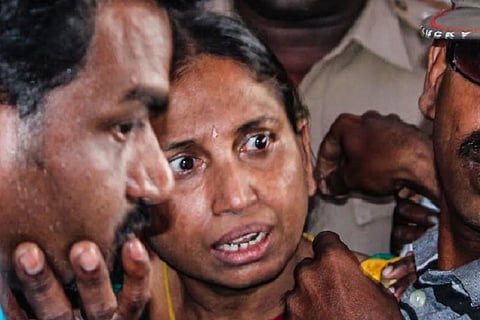

The Tamil Nadu government has objected to Nalini Murugan’s, a life convict in the Rajiv Gandhi assassination case, request to seek parole of six months to make arrangements for her daughter's wedding.
In its submission before the Madras High Court, the state government has objected to Nalini’s parole on the grounds that it will have “international ramifications” and she may escape from lawful custody. The state argued that Nalini has been convicted for a case that can be classified as the 'rarest of the rare', as it involved her 'doing away the life' of a former Prime Minister of India. It further claimed that commuting the penalty from death to a life sentence does not reduce the gravity of the crime she has committed.
“In view of the gravity of offence committed by the petitioner, having international ramification, the respondents can reasonably apprehend that the petitioner, if released on leave may escape from the lawful custody. Hence it is humbly prayed that the request of the petitioner deserves no merit and therefore it is prayed that his Hon'ble court may be pleased to dismiss the above writ petition as devoid of merits and thus render justice,” reads the state government's reply to the court.
Speaking to TNM, Nalini’s counsel Radhakrishnan argued that the reasons given by the Tamil Nadu government are “not right”.
He pointed out that AG Perarivalan, who was also convicted along with Nalini and five others in the assassination of Rajiv Gandhi, was granted parole recently for two months owing to his father’s illness.
“Perarivalan was given parole for two months. His offence is the same as Nalini. All of these seven people (convicted in the case) are conspirators. They didn’t commit the offence,” argues Radhakrishnan, adding, “By rejecting her parole, the Tamil Nadu government has violated Articles 14 (equality before the law) and 21 (right to life) of the Constitution.”
Radhakrishnan said that all life convicts are entitled to “ordinary leave” and that they cannot be treated differently.
Nalini’s counsel also pointed out that she was eligible for release as early as 2005, after spending 14 years in jail. However, he noted that she was not released at the time as the offence was investigated by the CBI, a central agency.
In February 2014, then Tamil Nadu Chief Minister Jayalalithaa had stated that the state would release all seven convicts in the Rajiv Gandhi case.
“Whether the Centre responds to our recommendation or not, we will invoke the powers vested with the government and release them,” Jayalalithaa had said in 2014.
Although the Centre later blocked the move, Radhakrishnan pointed to the inconsistency of the present state regime, noting, “When a person is found fit to be released permanently can she be denied leave? It is unfair on the part of the government that Nalini should not be given parole.”
In March 2016, Nalini, who is lodged in Vellore jail was granted a 24-hour parole to attend the last rites of her deceased father. In her 26 years of incarceration, this was only the second time she had gotten parole. In 2004, she had got parole to attend her brother's wedding.
Interest in the case has peaked again after Justice (retd) K T Thomas who was part of the three-member Supreme Court bench that confirmed the punishment to the convicts, wrote to Congress President Sonia Gandhi asking her to display magnanimity and allow the release of prisoners who have been in jail since 1991.
In his letter dated October 18, Justice Thomas pointed out that a decision to grant remission by the Tamil Nadu government in 2014 was opposed by the Centre. Following this, the matter is pending before the Supreme Court.
“Perhaps the Union government would agree if you and Rahulji (if possible Priyankaji also) would write to the President of India conveying your willingness to grant remission to these persons who have already spent the longest period of their life in prison. It appears to me as a matter of human consideration which you alone can help," the retired judge says in his letter.